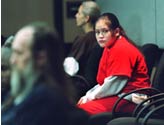|
Sunday, September 28, 2003
After 11 months of study behind bars, Petrona Tomás
has learned enough Spanish to recount the events that have led to
her grave predicament in this often bewildering new land.
Accused murderers seldom come with National Geographic
résumés. Tomás is perhaps 15 years old, though no one knows for
sure. She stands almost 4-foot-10. She has the lilting voice of
a schoolgirl. An Akateco Indian, she was born in the Guatemalan
mountain village of San Miguel Acatán -- a place considered primitive
even among the indigenous Mayan people -- and until recently spoke
only the obscure dialect called Kanjobal.
Tomás says she fled Guatemala last year because she
feared for her life, and survived rape and a harrowing walk through
the Arizona desert on her 25-day journey to South Florida. "La Cruzada,"
she calls it now -- "The Crossing."
She entered the judicial system in October after giving
birth to a 2.77-pound girl in the bathroom of a Lake Worth apartment.
Police found Tomás bleeding and disoriented. They found the newborn
wrapped in a plastic bag in a garbage can. A medical examiner found
a wad of toilet paper in the baby's throat and ruled the death a
homicide.
On Monday, Palm Beach County Circuit Judge Hubert
Lindsey is scheduled to hold a plea conference for Tomás and, with
wide discretion, consider charges that range from manslaughter to
first-degree murder, with penalties from probation to life in prison.
Six months ago, her teacher at the Palm Beach County
Jail stunned the Mayan girl with the revelation the world was round,
not flat. She already knew the world was harsh.
How much for an 11-year-old?
Her father sold her to a man when she was 11, Tomás
says. Villagers say Miguel Pascual Tomás took the several thousand
dollars he received and bought a van.
"I was playing in a tree with my (siblings) and friends
when my dad arrived with the man," says Petrona Tomás in simple
yet articulate Spanish during a telephone interview. "My mother
said my father said that the man was going to be my husband. I didn't
want (that) and I went away to my grandmother's house to hide."
The man, Agustin Francisco, found her and took her
to the village of Barrillas, five hours away. He died of malaria
a year later. Tomás said she was abandoned until an immigrant smuggler
-- a "coyote" named Armando Domingo -- took her in when she was
about 13. Tomás says Domingo drank heavily, beat her and threatened
her with a pistol. After a year of abuse, she says she fled to her
mother's house, and the woman contacted Tomás' brother, Mario, who
was working in Florida. Mario sent 10,000 Quetzales (about $1,250)
to Tomás to hire smugglers to get her out of Guatemala and bring
her to Florida.
The trip from San Miguel Acatán to Lake Worth took
most of four weeks. She traveled through Guatemala to the Mexican
border in a group of 12 to 15 people -- three other women -- first
in a minivan, then in pickup trucks. A coyote named Felipe bribed
Mexican immigration officials at San Cristobal de las Casas, in
the state of Chiapas, and the group entered the country. They bought
clothes of the Tzotzil Mayans who live in the area and changed out
of what they were wearing to blend in with the locals.
"I bought the uniform of the Tzotzil," Tomás said.
"They gave me some papers to learn Tzotzil. I learned a few words."
The group took public buses through Mexico. Tomás
sat next to a Mayan man from Barillas who was heading to Texas to
work. "I felt very lonely," she said.
Felipe led the group to the U.S.-Mexico border, somewhere
near what Tomás believed was "the city of Arizona." She says Felipe
separated her from the group, took her to a hotel room and raped
her there. The next day, he took her to meet another coyote, named
Miguel, who was preparing to lead a group of 18 people through the
desert into the United States.
36 hours across the desert
Tomás wore jeans, a T-shirt and tennis shoes. She
had a loaf of white bread (pan Bimbo), a few cookies (galletas),
one large bottle of water and two small ones. Her brother Mario
had sent Miguel about $1,000 to pay for the crossing. The group
left at 2 p.m. and walked in single file for 36 hours, stopping
only once for one hour's rest. The point of crossing is uncertain,
but it probably was somewhere west of Nogales, in Pima County, where
immigration officials say many migrants have entered recently.
"I was afraid of the many animals, and that I would
get lost in the desert," Tomás said. "I was tired. I couldn't walk.
I kept falling from tiredness."
She said the howling wolves and the many snakes along
the way frightened her. Tomás said the men pulled her hair when
she fell behind. The only other woman in the group could not take
the grueling pace and turned back to Mexico.
They arrived on a highway in Arizona and waited for
three hours for a pickup truck that took them to Miguel's house.
They stayed there two days, and then a Latino man and an Anglo woman
came with a van to take them to Lake Worth. Eleven other migrants
made the three-day trip; Tomás was the only female. She had no money
and did not know how to order at fast-food restaurants, so the driver
brought her a hamburger and soda once each day.
"I was very hot," she said. "I was very hungry. I
was very thirsty all the time."
She was also very pregnant, but had no clue what was
happening inside her body. "I thought," she said, "that my periods
were in my stomach."
The van arrived at a gas station in Lake Worth, where
Mario came and paid the smugglers $1,000. It was late June or early
July in 2002. Tomás went to the apartment at 714 South H Street
to live with Mario, and another brother, Francisco. She would have
worked in the fields, but because she arrived after the growing
season, she became a housekeeper instead. She rose at 5 a.m. to
make the men tortillas for breakfast, then cared for the children
during the day. Tomás rarely left the house. She went to the supermarket
with her brothers and on Sundays attended Mass at Sacred Heart Church
in Lake Worth.
"I lived like a little dog," she says.
On Oct. 9, a woman who was living near the house called
Lake Worth Fire-Rescue and reported that Tomás had delivered the
baby. She was alone during the breech birth, had cut the umbilical
cord herself and was bleeding when paramedics found her.
Her attorneys will not permit Tomás to talk about
the birth, but she told the paramedics that she believed the baby
was not breathing. Besides the toilet paper found in the baby's
throat, there also was a wad found in its ear. In the Mayan culture,
bodies often are prepared for burial by putting cloth in the orifices.
A study released in 2000 by the Centers for Disease
Control found that U.S. newborns weighing only 2.77 pounds have
a death rate about 20 times higher than babies of average weight.
Guatemala's indigenous people have a much higher infant mortality
rate, however, and Tomás' physical ordeal during the pregnancy adds
risk factors. The medical examiner, according to police records,
reported that the baby's lungs had "inflated and accepted air" and
ruled that asphyxiation was the cause of death. The infant may have
been two months premature.
Questions in Spanish
The night of the birth, Lake Worth police interviewed
Tomás in her bed at Bethesda Memorial Hospital in Boynton Beach.
They questioned her in Spanish, a language that all involved in
the case agree she could not speak with any fluency. She had four
years of schooling in Guatemala, but that was only for one or two
hours a day. At home, she communicated exclusively in her native
dialect.
Police did not try to find a Kanjobal interpreter.
Her father, who four years before had sold her away, waived her
Miranda rights.
The transcript of the interview contains mostly one-word
answers to often disjointed and leading questions, yet it was the
basis for the first-degree murder indictment that came from a grand
jury a month later. She told police she didn't know she was pregnant
and thought the pain was menstruation. She said the baby's feet
came out first, and she believed it was dead. At one point, when
language failed, Tomás tried to act out what had happened for the
two officers.
In June, immigration attorney Aileen Josephs petitioned
Juvenile Court Judge Roger Colton to name a legal guardian for Tomás,
claiming that she had been abandoned and neglected by her parents.
The judge reviewed the evidence of sexual and physical abuse and
agreed. He named Marisol Zequeira Burke, an attorney with Catholic
Charities in Stuart, to represent the teen's interests. Ms. Burke
has a family willing to adopt Tomás and has worked with the Florida
Department of Children and Families on a plan for her future.
But any plea arrangement Judge Lindsey might accept
Monday appears likely to lead to Tomás' deportation. The Immigration
and Naturalization Service, especially because of post 9/11 crackdowns,
is almost certain to deport anyone who pleads guilty to manslaughter,
the least serious charge that prosecutors are likely to accept.
The case took a sharp turn last week when Ms. Burke
petitioned the court to allow Miami lawyer Brett Newkirk to represent
the girl, instead of West Palm Beach attorney Marc Shiner. Advocates
for Tomás complain that because Mr. Shiner, a former prosecutor,
was hired by the Guatemalan-Maya Center and the girl's father, he
has conflicts of interest. Mr. Newkirk gained notoriety last year
when he represented three Muslim medical students who were stopped
on Alligator Alley after a woman thought she overheard them discussing
terrorist plans at a restaurant on Interstate 75 in Georgia.
Ms. Josephs and Ms. Burke believe that Tomás' life
will be in danger if she returns to Guatemala. Media accounts there
have portrayed her as la asesina (the assassin), and a largely misogynist
society has little use for disgraced women. Tomás also fears retribution
from Domingo, whom she believes is the father of the newborn. There
are no women's shelters in Guatemala.
"I believe Petrona has come to give a greater message,"
Ms. Josephs says. "She could be a catalyst for children's rights,
for human rights, for women's rights, for issues that are much larger."
Supporters plan a prayer vigil at 1 p.m. today at
Sacred Heart Church in Lake Worth. They plan to raise money for
a trial defense in the likelihood that plea negotiations fail.
Tomás' emotional state has improved since her first
weeks of confinement when, supporters say, she was bewildered and
wept for long stretches. Her teachers say she has progressed well,
learning to read and write in Spanish. She also enjoys mathematics
and is permitted to play basketball every few weeks. Her days begin
with breakfast at 4:30. Her father visits, and still denies trading
his daughter away for money.
"I said to my father, 'Why did you sell me?'" she
says. "He said, 'I didn't sell you. I gave you away. Forgive me.'"
Asked what she wants for her future, she struggles
to comprehend the idea of having one. "To leave jail," she answers,
"To study. And to learn English."
She said she hopes to become a teacher.
dan_moffett@pbpost.com
|

